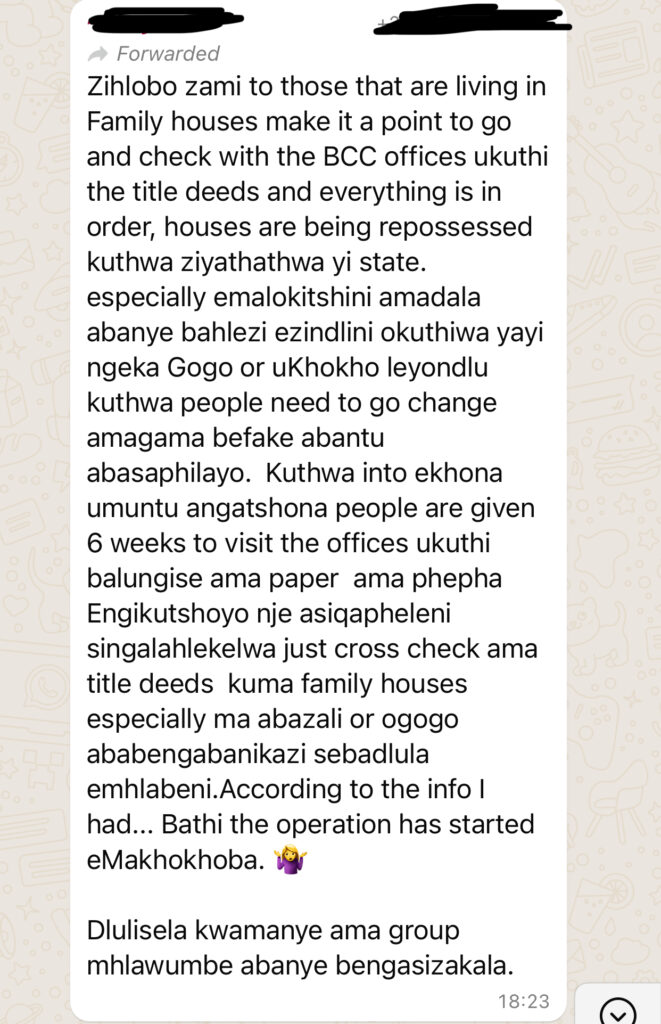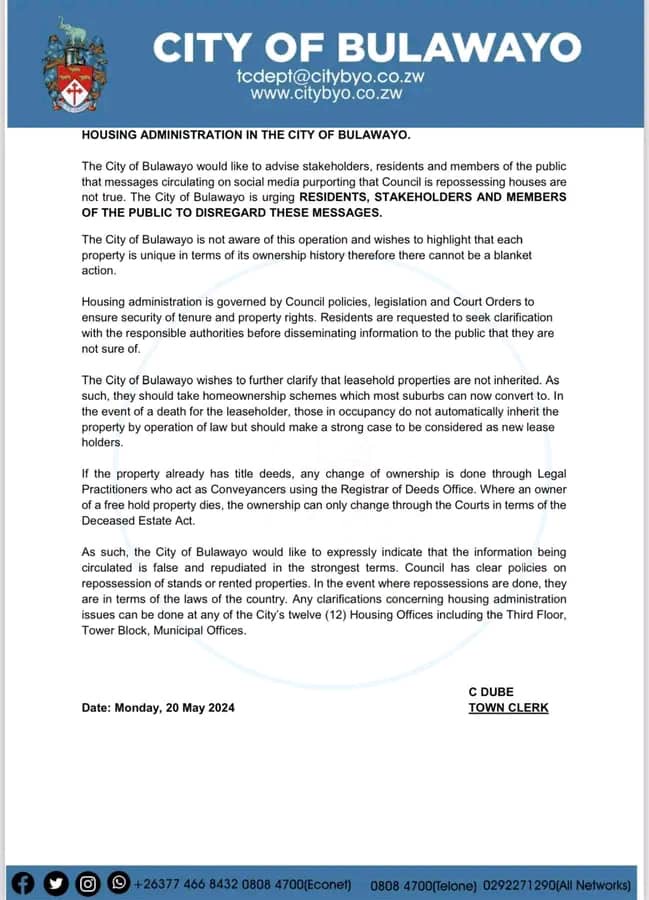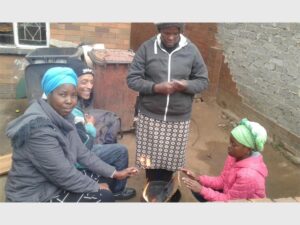Important information to note
(i) THE city council does not deal with houses that have title deeds. In the event of a property owner, with title deeds, dying, the estate is handled under the Deceased Estate Act. The council plays no role in this process except to change the ownership as directed by the courts.
(ii) SOME houses, however, do not have title deeds. This is because they belong to the City of Bulawayo and those who live in them do so on the basis of being lease holders, having certificates of occupancy or having agreements of sale.
(iii) LEASEHOLD properties are not inherited. These are properties that people occupy on cessions with 25, 40 and 99 year leases as well as those with agreements of sale. Currently, the Council has a scheme where these can be converted from rental to home ownership. It is vital to note that as of the end of April 2024, 1 057 houses in Iminyela have not been converted, 1 609 in Mabuthweni, 127 in Emganwini, and 716 in Makokoba/Mabuthweni. That is 3 509 houses that the council can repossess if its Occupation of Council Property By laws are contravened.
(iv) IN THE event of the death of the leaseholder, those in occupancy do not automatically inherit the property by operation of law but should make a strong case to be considered as new lease holders.
(v) WHILE there is no specific operation on repossession of houses, city housing administration is governed by Council policies, legislation, and Court Orders to ensure security of tenure and property rights. As of April 2024, council had resolved to repossess 6 of its houses in Makokoba from their registered tenants.
(vi) IF YOU are occupying a house, especially in Makokoba, Mzilikazi, Mabuthweni, Iminyela and Emganwini and are not sure of its ownership status, or you think you ‘inherited’ it from a deceased parent or relative, it might not be yours to inherit. Or even to occupy. Visit the Council’s Housing Offices for clarity.
In a message that is circulating on WhatsApp, the writer claims that some houses in Bulawayo’s high-density suburbs are being repossessed. The Bulawayo City Council responded through a press statement saying, ‘The City of Bulawayo would like to expressly indicate that the information being circulated is false and repudiated in the strongest terms’.
While the City of Bulawayo’s press statement is technically true, it has a lot of missing context.
The writer makes a number of claims in the post that the Council of Bulawayo press statement seeks to address. FactCheckZW looks at the various claims in light of the press statement.

CLAIM 1: ‘Zihlobo zami (my fellows) to those that are living in Family houses make it a point to go and check with the BCC offices ukuthi (if) the title deeds and everything is in order, houses are being repossessed …
VERDICT: True
The City of Bulawayo has been on record re-possessing or seeking to repossess houses from occupants/tenants who flout occupancy or lease conditions. There are council minutes to this effect as well as media reports here and here. According to council minutes for 3 April 2024 (Annexure C – 18), the Housing and Community Services Department ‘proposed repossession of House No 42043/11/2 Mabusela Flats, Makokoba; 44033/08/01 Makokoba; 42067/7 Makokoba, Vundu 92127 Makokoba, 1489 Makokoba and 2116 Makokoba’. The same meeting resolved that ‘authority be granted for an eviction order in terms of the law and policy’ and ‘that the properties were repossessed from the beneficiaries as detailed in the report’. The Council of Bulawayo in its press statement claims that ‘messages circulating on social media that Council is repossessing houses are not true’ is misleading and fails to provide the full context. The claim that ‘houses are being repossessed’ is rated as true since Council in the month of April did resolve to repossess 6 houses in Makokoba.
CLAIM 2: kuthwa (it is said) ziyathathwa (they are being taken away) yi (by the) state. especially emalokitshini amadala (in the old high density suburbs)
VERDICT: False
The state is not involved with the running and administration of council property. Residential properties in urban areas fall under the purview of the Councils concerned. The claim that houses are being repossessed by the state is rated as false.
CLAIM 3: Abanye bahlezi ezindlini okuthiwa yayi ngeka Gogo or uKhokho leyondlu kuthwa (Some people are living in houses which previously belonged to either their grandmothers or ancestors. It is said such) people need to go change amagama befake abantu abasaphilayo (replace ownership with names of surviving beneficiaries).
VERDICT: True
The City of Bulawayo has policies that govern the occupation and lease of council property. This by law states that just because a house previously ‘belonged’ (was leased) to one’s parents or grandparents, does not mean that the descendant has the right of occupation or lease. Once the person who had the lease or certificate of occupation dies, the council has to be notified and a new lease issued. According to the by laws, these changes do not only happen when the leaseholder or person with certificate of occupancy dies, it can even happen when the child ceases to be a dependent in single dwellings; ‘If a person who has been occupying council residential property within the area without a certificate of occupation because he is the dependant of the holder of a certificate of occupation ceases to be a dependant, apply to the director for a certificate to reside in the area. (4) Whenever any person referred to in subsection (3) applies for a certificate of occupation in terms of these by laws, the director shall issue a certificate to such a person, unless in the director’s opinion, the issues of such a certificate would result in the overcrowding of the council residential property concerned’.
This means that a child who is no longer a dependent can be denied permission to continue residing in this house if the Director’s opinion is that this would lead to overcrowding. In its statement, the council does state that, ‘leasehold properties are not inherited’. This means that when for example, one’s father who had the certificate of occupancy dies, it does not mean that their heir has the right to inherit that certificate. Because these certificates of occupancy and leases can not be inherited, the claim that people living in houses previously ‘owned’ by their deceased grandmothers or ancestors, need to visit council offices and regularise their stay has been rated as true.

CLAIM 4: Kuthwa into ekhona umuntu angatshona (It is said that when the owner of the house dies) people are given 6 weeks to visit the offices ukuthi (to) balungise (regularise) ama paper ama phepha (papers).’
VERDICT: Partly true
This claim is rated as partly true since it gets the time of notification wrong but gets it right that when a person with a certificate of occupancy dies, the council has to be notified. The by laws state that, ‘The holder of a certificate of occupation in respect of any council residential property shall, within seven days on the relevant event, report to the director-
(a) any change in the marital status of any person occupying the property; and
(b) the birth of a child to any woman occupying the property; and
(c) the death of any person occupying the property.’
This shows that occupants have 7 days to report the death of the holder of a certificate of occupation.
CLAIM 5: According to the info I had… Bathi (they are saying) the operation has started eMakhokhoba. Dlulisela kwamanye ama group mhlawumbe abanye bengasizakala (Pass on the message to other groups maybe some people can be assisted.’
VERDICT: False
The repossession of properties is not part of an operation but part of the council’s continuous assessment of those occupying its properties. As shown in the case of the 6 houses set for repossession in Makokoba, the reasons are varied. Two of the houses were occupied by people who have since died and had no records of having any children. Another house has an occupant who is not the registered tenant at council. Yet another is occupied by a late registered tenant’s niece who lives in South Africa and is subletting the property. The sixth one, council records show that he now owns a house elsewhere in the city. While it is false that there is an ongoing operation as claimed in the WhatsApp message, the Bulawayo City Council is constantly carrying out inspections and checking whether the registered tenants are the ones occupying its properties.
Conclusion
While the City of Bulawayo in its press statement dismissed the WhatsApp message in its entirety, saying ‘the information being circulated is false and repudiated in the strongest terms’, there are elements of truth in the circulating message. Repossessions do happen and council has clear policies on how these repossessions are done. As the message circulating on WhatsApp urges, if you are occupying a house, especially in Makokoba, Mzilikazi, Mabuthweni, Iminyela and Emganwini and are not sure of its ownership status, or you think you ‘inherited’ it from a deceased parent or relative, it might not be yours to inherit. Or even to occupy. Visit the Council’s Housing Offices for clarity.











